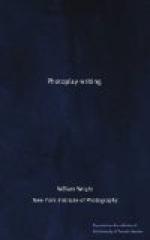Finally, economy should always be the guide followed by the author in writing his story. If, after it has been accepted, the director chooses to stage it with more than ordinary care and expense, so much the better. But the director and not the author will be the one to decide how it is to be staged. If the story is good, it will not be slighted in its production.
CHAPTER XVI
WHAT YOU SHOULD NOT WRITE
1. The Work of the Censors
From the time that you begin to write moving-picture plays, one important fact must be borne constantly in mind: The National Board of Censorship inspects and passes on all films before they are permitted to be released, and this Board will not pass any subject it considers objectionable. It is not our province to discuss the methods of the censors in making decisions, though in some sections the local board carries the censorship idea to extremes, even barring some subjects that have already passed the National Board. It is safe to say, however, that the folly of hacking to pieces a film portraying Shakespeare’s tragedy of “Macbeth,” on the ground that it contained too many scenes showing murder and other crimes, will soon become apparent even to over-zealous police and other censors of certain cities. As Mr. W. Stephen Bush writes in The Moving Picture World: “A very small and a very short-sighted minority of motion picture manufacturers, together with occasional lapses of National Censorship,” are responsible for the exceedingly silly and presumptuous system now existent in some localities.
It is because of this “small and short-sighted minority” that we offer this advice: Write as your conscience and a sense of decency as an individual and as a good citizen dictate. The chances are that then your photoplay will meet with no serious objection. Do not introduce a crime-scene into your picture simply because when you saw a similar scene in a photoplay it aroused a moment’s thrill among the spectators. The fact that it passed the National Board and the local censorship committee—if your city has one—does not mean that it is the kind of picture the better class of theatre patrons want, and the better class ought to be set up in your mind as the judges of all you write. A bad example will not justify you in writing a play containing objectionable scenes. The safe ground is the best ground because it is right.
The following list of features disapproved by the National Board of Censorship gives a good general idea of the things that may be regarded as under the ban, not in one or two special cities, but throughout the country. It is not a copy of an official list, as, to the best of our knowledge, none such is sent out; it is merely a draft prepared by Mr. John F. Pribyl, then with the Selig Company, after he had had a conversation on the subject with the Secretary of the National Board, Mr. Walter Story, and courteously transmitted by Mr. Pribyl to the authors of this volume.




